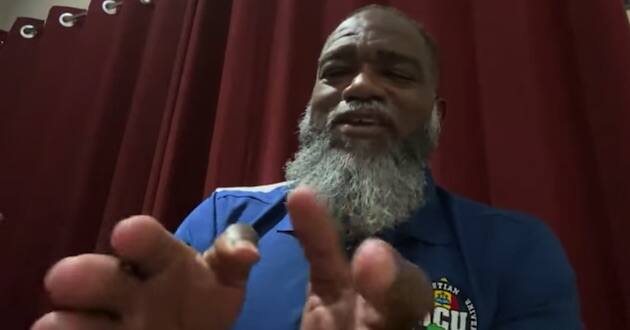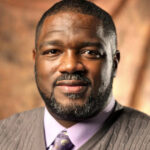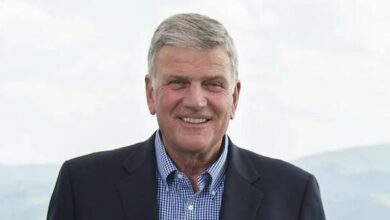‘Social justice not the same as biblical justice,’ black theologian warns Christians

Voddie Baucham, an American who is currently Dean of Theology at African Christian University in Lusaka, Zambia, appeared on The Glenn Beck Radio program recently to explain the social justice and Black Lives Matter movement and warn believers of it’s often “anti-Christian” message.
Baucham also explained why it is that people seem to be speaking two different languages when it comes to discussions we’re having after the George Floyd murder.
Baucham is one of the more potent Christian speakers today and has addressed the issue of social justice at length for well over a decade. He believes it runs in direct opposition to the Christian Gospel message.
Beck and Baucham began by discussing Gnosticism, which comes from the Greek term “gnosis” or “having secret knowledge.” Baucham coined the phrase “ethnic Gnosticism” which, as Josh Buice explains, is “the idea that black people (and other ethnicities including white people as well) have the ability to possess secret knowledge of motive, intent, and goals in specific situations such as the recent cases involving police officers and black men.”
This is critical, Baucham explains because he believes it runs counter to the Christian Gospel.
“We have to understand that our knowledge comes from God, that God is the source of all knowledge,” Baucham said. “We understand that the Scriptures are sufficient. And we go to the Bible, to understand truth. And we look at the world — the way the world is… So as Christians, these are the ways that we seek truth. Not through special individuals, who have special knowledge.”
Baucham explained how many social justice leaders today have “likened this movement, this sort of anti-racism movement, to a religion. Jim Wallace wrote a book, and the title of his book was, ‘America’s Original Sin.’ So, again, there are religious connotations there.”
READ: What does BLM organization really believe?
“And what worries me about this, is that there are real problems. There are — there’s real racism. There’s real evil. There’s real hatred. There’s real injustice. And the answer to those things, is a God who saves, through Jesus Christ. That’s our message as Christians, right? Or at least it used to be.”
“Now the message is — the answer is something other than than the forgiveness that we find, through God in Christ. Now the answer is, somehow you have to do enough penance. And it’s been interesting to watch scenes of white people, literally kneeling and bowing and genuflecting, in repentance, you know, over their sin of — of white privilege. Or, you know, bias. Or conscious bias. Or unconscious bias. Or whatever else.”
Baucham says this is precisely why the social justice movement, while well-intentioned (by most) is ultimately problematic.

“And the problem is, that this religion is promising salvation, somewhere other than God,” Baucham said. “And unfortunately, there are many Christians, who are sounding like they’re satisfied with this.”
Baucham says that there’s more to the social justice movement than what Christians typically think of justice. “Social justice is about redistributing resources and opportunities,” Baucham explained. “Social justice is not the same as the biblical idea and the biblical concept of justice. You also need to understand that social justice is built on the back of critical theory. Which is all about the idea of, you know, hegemony and power structures.”
Former pastor @VoddieBaucham REFUSES to stay silent against the "poisonous" ideologies of social justice and Marxism: "I am not willing to lay down my Bible and have anyone force me to agree with certain things." pic.twitter.com/QJ9Iv2sG46
— Glenn Beck (@glennbeck) June 18, 2020
Beck described this as “an upside down world from what God wants” saying that an “earmark of anything that I think would be evil, would be, there is no forgiveness.” Beck went on to say that people seem to “want to get along” and help the situation, but what’s happening now is people are expressing sympathy and wanting to help, but they’re also being accused of causing all the pain in the first place. “That doesn’t make any sense to me,” Beck concluded.
“I think you hit on something that is very important when you say, that doesn’t make any sense to me,” Baucham began. “I think what’s happening is, people are having two different discussions. And they don’t realize they’re having two different discussions.
“People look at — for example, like the George Floyd death and they see this tragic situation. And on the one hand, there’s this universal condemnation, of what happened.
“But then what happens, people are explaining this, in two different ways. There are some people saying, ‘see, there is the racism.’ And there are other people who are saying, ‘wait, you know, there are four officers. Two black. One Asian. The officer that did this, how do we just declare that this is racism?’” Baucham explained.
“And what that’s an example of is these two competing worldviews. One worldview, that says, racism is individual. It’s an individual heart issue. And that’s the world where we deal with the individual heart issue, with the message of the gospel. But then there’s another worldview that says, no, no, no, no. Regardless of individual heart issue, this is a structural and institutional issue.”
Baucham added, “Therefore, and this is what boggles people’s minds. Sometimes they’ll say, it doesn’t matter what the facts of the case are. This is evidence of structural and institutional racism. And what that’s doing is it’s driving people apart. Because we’re having two different conversations, that doesn’t make sense to each other.”
Baucham says he’s been attacked for speaking his views on the social justice movement, which he says is frustrating.
“When you talk about it from the big picture, people tend to think, oh, you just don’t have empathy. You just don’t have compassion. You just don’t understand how bad it is,” an incredulous Baucham said. “Me. Who grew up in drug infested, gang infested, Los Angeles, born in 1969. Grew up during the crack era. Grew up during the drug wars with a Buddhist mother. I wasn’t raised in Christianity. Never heard the gospel, until I got to university. And so for people to try to marginalize me, because I don’t understand — I’ve been pulled over by the cops. I’ve been down on the sidewalk. Because I was sitting in the wrong place at the wrong time. I know these kinds of things happen. And yet, I still say, that these ideologies are poisonous.”
Baucham says messages that point to a salvation other than the Gospel of Jesus “have to be confronted” because “these ideologies actually undermine our message, as Christians. I’m concerned about people. I’m concerned about justice. I’m concerned about souls. And I know where this stuff comes from. I understand where it comes from. And I am not willing to lay down my Bible and have anyone force me to agree with certain things, simply because, if I don’t, they will — you know, they will somehow label me and call me names.”
For emphasis, Baucham says “I couldn’t care less about people labeling me and calling me names. I know who I am before God. My conscience is clear.”
Baucham went on to explain that, as an expat in a foreign country, there are “two things I know” about the world. The first is “black people in America are the freest and most prosperous black people in the world. Period. Bar none.”
The second, “People outside of America, just think that we are the most oppressed people in the world. And people actually think that things like George Floyd are happening every day. That they’re not an anomaly. But that they’re commonplace. It sickens me. And it saddens me. But also the reputation that black people have, that somehow we are weak and impotent. And that we can’t do or be anything, unless white people do it for us. Which, by the way, is kind of racist. I — I believe that — I am a descendant of some of the strongest people in the history of the world.”
Baucham wondered why a people strong enough to overcome slavery would be “bowing and scraping, like we need someone to do something for us.”
“Our individuality is at stake. Our self-pride is at stake. And our trust in about to do as the answer and solution to our problems is at stake.”
–CBN News Service






